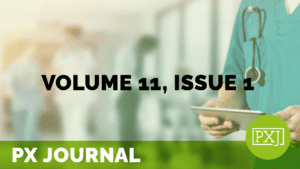Exploring Consumer and Clinician Attitudes towards Patient Reported Outcome Measures (PROMs) in an Australian Inpatient Musculoskeletal Rehabilitation Unit: A Qualitative Pilot Study

This pilot qualitative study explores consumers’ and clinicians’ perspectives about the relevance and utility of patient reported outcome measures (PROMs) in an Australian inpatient rehabilitation unit. Methods: Two focus groups, were recruited via convenience sampling, comprising English speaking rehabilitation clinicians (n = 5) and consumers (n = 6) who had recent experience of inpatient musculoskeletal rehabilitation in a large, privately funded, rehabilitation hospital in Melbourne Australia, in 2020. The focus groups were conducted via videoconference, moderated by two experienced rehabilitation clinician-researchers, following semi-structured interview guides. Focus group recordings were professionally transcribed for coding and thematic analysis by two researchers, with consensus reached about final themes. Results: Rehabilitation clinicians and consumers identified potential utility in measuring PROs at the patient level to improve patient-centred care and team coordination, and at the system level through quality improvement, benchmarking and research. Benefits were viewed as contingent on a clearly articulated rationale for measurement, careful selection of PRO instruments and specific application in target populations, with doubts expressed over their specific utility in musculoskeletal rehabilitation. Risks associated with PROMs were also identified, including procedural burden, emotional distress, psychological safety, incomplete forms and opportunity-cost. Clinicians and consumers expressed concern over the validity, reliability and representativeness of PROM data. Conclusions: While the potential benefits of PROMs were recognised, numerous risks and logistical challenges were also identified. The current lack of confidence from both clinicians and consumers in the inherent value of PROM data and its ability to improve patient care or quality standards will likely impede successful incorporation into routine rehabilitation care.
Related content
-
 Policy & Measurement
Policy & MeasurementAssociation Between Clinicians’ Average Patient Length of Stay and Patient Experience Scores
Objective: Given the current emphasis on patient-centered care, emergency physicians are seeking ways to improve patients’ experience in the emergency department (ED). Length of stay (LOS) in the ED has previously been associated with patient experience ratings, however there is limited literature on this relationship at the clinician level. The objective of this study was
Learn more -
 Policy & Measurement
Policy & Measurement“Feedback is indeed a dainty dish to set before the Trust”: Comparing how online patient feedback is responded to and used across three hospital Trusts in England
Patients are increasingly reporting about their healthcare experiences in an unsolicited manner online. This emerging resource may offer valuable opportunities for organisational learning. Our study aimed to compare how online patient feedback was responded to and used for improvement in three hospital Trusts. Ethnographic data were collected across three hospital Trusts in England, recruited according
Learn more -
 Policy & Measurement
Policy & MeasurementEnhancing Post-Visit Communication: A Quality Improvement Initiative
With grant funding from The Beryl Institute, Briargate Outpatient Specialty Care Clinic at Children’s Hospital Colorado launched a quality improvement project to tackle the decline in patient and family experience scores concerning post-visit communication. By implementing targeted interventions, the clinic increased the percentage of families who felt well-informed about handling questions after visits from 72%
Learn more
